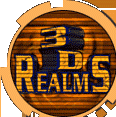The Apogee Legacy #5 - Frank Maddin
Today our "Apogee Legacy" Interview series continues with its fifth edition, this time with Frank Maddin, author of a few games with us. His first game with us was 1991's Crystal Caves, and then followed it up with 1993's Monster Bash. After that, he teamed up with Jim Norwood to do 1997's Shadow Warrior. Frank also briefly did some work with is on a fourth game after Monster Bash called "Cybertank", but it was abandonded early on in development (was to be a tank game with a 3D engine). Additionally, Frank is one of the few developers we've had to ever get dressed up as one of their characters (see the pictures below).
Frank now works at Microsoft, and was happy to participate in the interview series. Hereeeee's Frank! :)
Past Pioneers of the Shareware Revolution
Issue #5 - Frank Maddin
1) How did you first come in contact with Apogee?
I met George Broussard in Lufkin, Texas. He calls it a "stinky little town". His family had moved there from Dallas. I'd lived there most of my life.
I had a Commodore Amiga (Jack Tramiel was the devil the ST was crap) and knew very few people in town with one. So I put an ad in a local trade paper and his mom called me. We became good friends - his mom and I - eventually we let George hang out with us. :-) We commuted to college together in nearby Naca-nowhere.
Scott was a friend of George from back in Dallas and would come down to visit occasionally with Terry Nagy. We'd all go play tennis or something. Of course, I was by far the best tennis player and there was usually tears and gnashing of teeth, but I digress.
When George graduated he and his family moved back to Dallas. Fast forward a year or two and I had a job at Lockheed that I didn't like, and George was getting ready to compete with Scott because Apogee was starting to take off. I told him to send me some code and I'd take a stab at it.
A number of months into the development of Crystal Caves, George joined Apogee and Crystal Caves became an Apogee product.
2) Was there a reason you decided to work with Apogee, say versus going on your own or working with another company?
I'd just sort of fallen into game development. I doubt I could have gotten a job at a real game company, or started my own at that point.
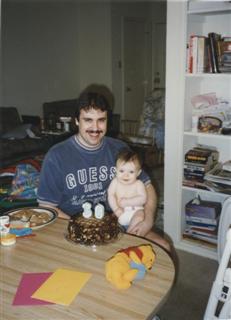
|
| Frank with his son back in 1991 |
3) Looking back, was there anything Apogee could have done better, regarding the marketing and distribution of your game?
Back in the day, the BBS was the main distribution method. The main form of marketing was mailing out to previous customers. Once they built up a reputation, that was pretty much all they needed to at least get new people to download and try new games. The 3 episode hook got people to pay. Worked pretty well for the time.
4) Do you think your game was made better or worse by working with Apogee?
The level of support varied from game to game. Sometimes tools, sometime design, etc. They generally had good design input. If I was making the game in a void I'm sure it wouldn't have turned out nearly as well.
5) Apogee had a policy of letting the designer or studio retain full intellectual property rights to their game. Nowadays, it's rare to find a publisher who allows this, especially if the publisher is providing the funding. Do you believe that it's best for the creator to retain IP rights? Why or why not?
Well sure, you should keep the IP. If the game is a hit it might be worth something. Seems to me it's about who has the upper hand and the position they are in. How badly does the publisher want the developer? How far along is the game?
5a) And if applicable, have you benefited from retaining ownership of your own IP?
I don't think it's highly applicable to me. Seems like with my projects it's kind of a joint ownership thing with Apogee. Of course I could do something with it if I got permission, or payed them something from profits.
5b) Do you think there'll ever be a sequel to your game(s)?
Probably not. I have the most fondness for Monster Bash, so if I could choose, that would be the one.
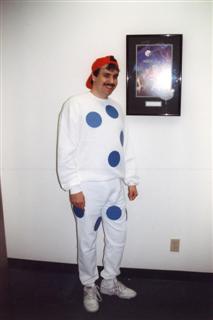
|
| Frank dressed up as Johnny Dash from Monster Bash at the 1996 Apogee Halloween Party |
6) Is there any story/incident that stands out as interesting during your time associated with Apogee?
There is an interesting "brush with greatness" with the author David Gerrold.
The fellow that wrote the script for the Star Trek episode "Trouble with Tribbles", David Gerrold, actually played and liked Crystal Caves. Mr. Gerrold, like Jerry Pournelle, was also a computer guy and wrote articles for computer magazines. I was reading a computer mag (I think it was a programming mag called PC Techniques) and I noticed that the author mentioned Crystal Caves, talked about it a bit, called out that the first episode was "Trouble with Twibbles" and seemed to think that was funny. At the time I thought it was cool but I didn't realize the significance. Not much later I think I picked up a SF book he'd written and saw that he wrote the Star Trek episode. I was pretty floored. That probably had something to do with his mention.
There is also the "Great Romero Misunderstanding"..
My best work was probably the snake in Crystal Caves. There is a story about that. At one point during development we'd flown to see id software (involved with Apogee) for business reasons and I'd shown CC to them. Later, I heard that John Romero thought I had stolen the snake from one of his earlier games it looked so similar. The truth was that I hadn't seen that game and that it was the only way I could figure out how to do a snake in 16x16 pixels. But it kind goes to show you the limitations can really influence what the art is. So John, REALLY, I didn't steal your snake! Swear to GOD mode. I just know this will get back to him.
I'm sure there are many others lurking but I can't dredge them up.
7) Apogee was an early pioneer in terms of teaming up with external designers and studios, and continues to do so even to this day (currently working with Human Head Studios on Prey). Why is it that so few other studios do this (mentor and fund outside projects with lesser known teams)?
Seems like a good thing. I'm not too up on these working relationships these days. Japan seems to have more separation of design and development, but that's maybe not quite the same thing.
8) What the biggest difference in the industry nowadays versus when you worked with Apogee?
I remember George said once, something like "Making games is too hard. id came along and screwed it all up. I'd have been happy making side scrollers forever". That was probably back in 94 or 95 or something. It's just gotten harder. It takes vast effort, lots of people, and oodles of resources.
9) What have you been doing since your time with Apogee?
Raising a couple of kids, enjoying life. Still making games. The majority of my time has been spent at Digital Anvil/Microsoft.
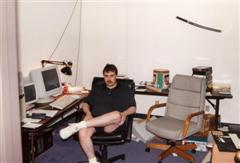
|
| Frank at his office at 3DR in 1997. |
10) If you're no longer making games, have you thought about returning to this industry? If not, why not?
N/A
11) Looking back, are there any missed opportunities that you wish you'd have jumped on?
Can't think of any large ones. Shipping earlier on all games would have been good.
Should have put a better level as the first level of Monster Bash. There were many that were better. Wouldn't have programmed the bug that didn't allow you to finish level 4 :-)
12) Other than your game(s), what's your favorite game released or produced by Apogee (or 3D Realms)?
Commander Keen. It opened my eyes to seeing the PC as something that could play games like a console. I didn't have a high opinion of the PC at the time, being an Amiga person and all.
12a) And what's your favorite 2-4 games released by anyone else?
Fairy Tale Adventure, Splinter Cell, Call of Duty
13) Is there anything else you'd like to add about your time here or to fans of your title(s)?
I had a lot of fun in those early days developing, and I hope you enjoyed playing.

The Shadow Warrior Team in 1997 (L-R):
Frank Maddin, Lee Jackson, John Galt, Keith Schuler, Jim Norwood, & Stephen Cole.

Screenshot from early build of Frank's cancelled Cybertank game.
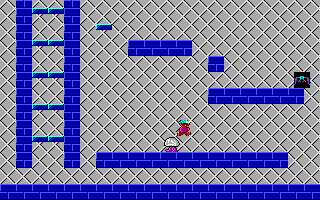
Screenshot from early beta of Crystal Caves.
Thanks to Frank for helping out with the interview series. We still sell all the games released with us during his time here (Crystal Caves, Monster Bash, & Shadow Warrior), so make sure and check them all out on our Games Page.
If you want to read more about Frank, you might also want to check out this interview done with him over at the "Perilous Crystal Caves" fansite, where he talks more about the development of Crystal Caves.
Make sure and tune in again next Monday morning, when we bring you the next in our Legacy Interview series.
Posted by Joe Siegler on February 6, 2006 at 11:58 AM | Permalink
| Discuss this story on our forums
News Categories: About 3DR / 3DR Staff | The Apogee Legacy
